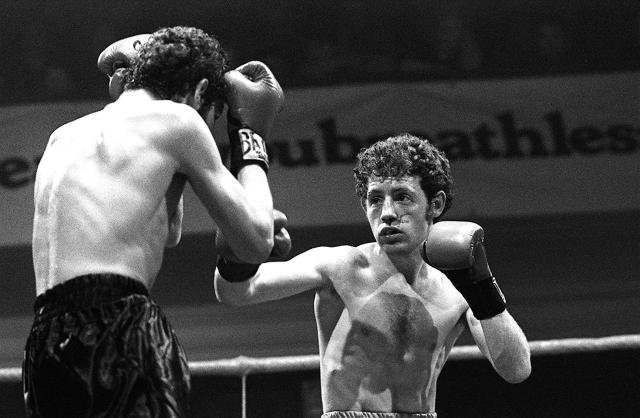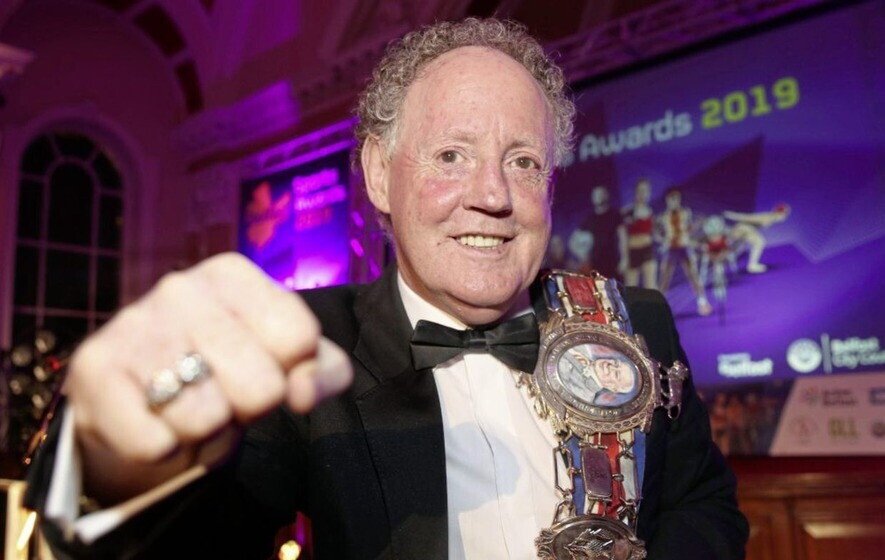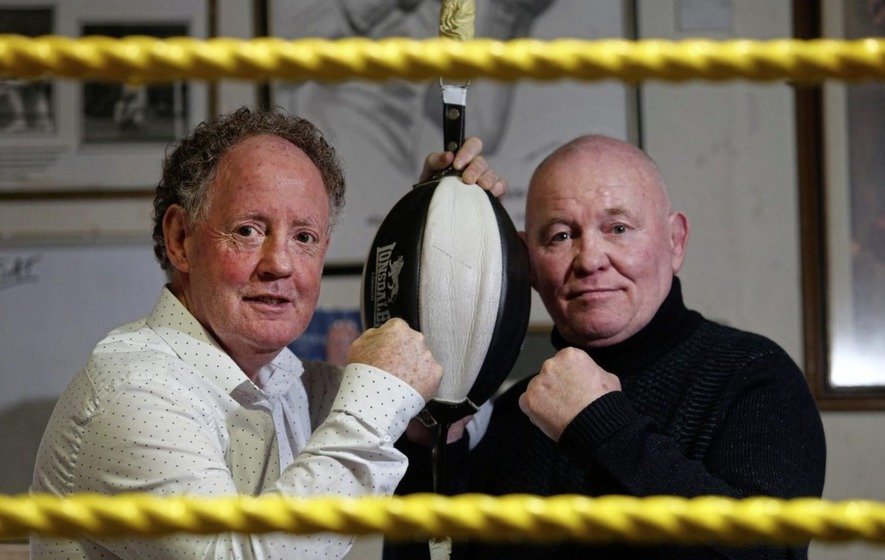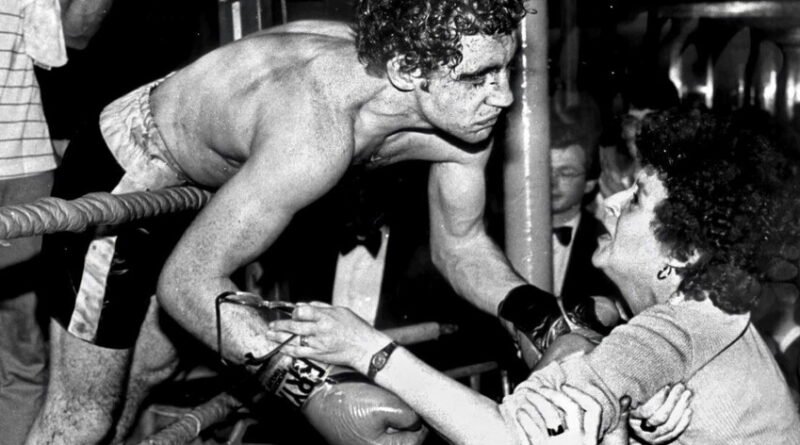RIP Little Red – Hugh Russell one of Ireland’s finest
By Chris McNulty
Hugh Russell, one of Ireland’s finest ever sweet scientists, passed away on Friday morning.
Following a battle with illness, ‘Little Red’ died in his native Belfast surrounded by his loving family at the age of 63.
A bronze medallist in the 1980 Olympic Games and the 1978 Commonwealth Games, Russell goes down as one of our best ever. And we’ve had some good ones.
The red-curled southpaw first stepped through the ropes under the tutelage of Gerry Storey and Bobby McAllister at the Holy Family Boxing Club in Belfast’s New Lodge.
Having forged a career subsequent to his boxing exploits as an award-winning press photographer, he became known to many of Ireland’s modern greats.
“What a lovely person, a true gentleman,” wrote former WBO world middleweight champion Andy Lee on X.
“One of the nicest men you could meet,” said Carl Frampton with Michael Conlan – who in 2012 followed Russell as an Olympic flyweight bronze medallist – adding: “What a great human being who will be sorely missed throughout the boxing.”
Such was his success, the Irish Athletic Boxing Association counted Russell’s Antrim, Ulster and Irish titles as ‘innumerable’.
Although beaten by Gerard Hawkins in the Irish flyweight final in March 1980, Russell headed for the Olympic Games in Moscow later that year.
He overcame Samit Khiniab from Iraq and Tanzania’s Emmanuel Mlundwa on unanimous decisions before booking his place on the podium thanks to a slender split decision win over Yo Ryon-Sik in the quarter-final at the Olympiski Sports Complex.
Russell was beaten by Petar Lesov from Bulgaria – who would win gold – at the penultimate hurdle, but his surge to bronze ended Ireland’s 16-year long wait for a first Olympic medal since his fellow Belfast southpaw Jim McCourt took lightweight bronze in 1964 in Tokyo.

At times Belfast was a dark place, but Russell was one of those who spanned divides beyond boxing.
He later recalled: “I am told that in the New Lodge area that there was a lot of rioting going on at the time of the Games and as soon as my fights came on the television, the streets cleared for fifteen minutes, and afterwards the rioting started again. . . I can only appreciate the achievement and with age the Olympic bronze will probably become my proudest moment.”
Irish Elite titles were Russell’s in ’79 and ’81, through wins over Noel Kirwan and Dave ‘Boy’ McAuley, after he won bronze at the 1978 Commonwealth Games in Edmonton, Canada, losing out to home puncher Ian Clyde after impressive wins over Russell Jones and Joseph Park put him on the rostrum.
Before Hugh made a further name for himself behind the lens, he featured in an iconic photograph himself. Brendan Murphy captured the moment at the Ulster Hall in Belfast as Russell leaned through the ropes to kiss his mother, Ellen, after beating Davy Larmour to win the Irish bantamweight title. The fight had been a war, taking the audience to the edges of their seats and then off them. Later that night, Larmour drove he and Russell to hospital, where they each received stitches.
Russell and Larmour crossed paths again in 1983, Larmour winning on points for the British bantamweight title.
In 1983 at the Ulster Hall, Russell defeated John Feeney in the last-ever 15-round British title bout. Feeney was disqualified by referee Sid Nathan in the 13th verse for persistent use of the head, with Russell capturing the British bantamweight crown.
Russell bowed out in February 1985 when a come-from-behind stoppage of Charlie Browne saw him retain the British flyweight title. That night, Russell grabbed the prized Lonsdale belt – he is one of only four men from Northern Ireland to hold the Lonsdale belt alongside fellow Belfast men Freddie Gilroy, Sam Storey and Neil Sinclair.
He later became a chief official in the British Boxing Board of Control and was inducted into the Belfast City Council sporting hall of fame in 2019. In 2020, the Ulster Boxing Council awarded him for his services to the sport.

Russell’s work in the Irish News saw him become one of the finest photographers, his images illustrating the pages of politics, Troubles, peace and sport. He was at the forefront of it all.
When Gerry Conlon left the Old Bailey in London a free man in 1989, having been wrongly convicted for the Guildford bombing, Hugh Russell was there to capture the moment.
His work as a photographer actually began in Moscow during the 1980 Olympics.
“Being in the Olympic village made it hard to spend any money as everything was free anyway to the athletes,” he would say in Barry Flynn’s book Legends of Irish Boxing. “At the end of the Games, I had an awful lot of spare money and you could not bring Russian money back with you. So I spied this large Zenith camera and bought it and that started me on the photography.”
In announcing Hugh’s passing on Friday morning, the Irish News said he was ‘the heartbeat of boxing in Belfast and a much-loved colleague’.

Niall O’Carroll, Chair of the IABA Board of Directors, said Hugh ‘was the man who started the modern success of Irish Olympic Boxing’ and promoter Frank Warren said he was: ‘above all else was a thoroughly nice man and a great ambassador for boxing in Northern Ireland’.
To Hugh’s wife Kathy, his children Hugh Junior, Hayley, James and Calum, we send our sincere sympathies.
Rest In Peace, Little Red.





